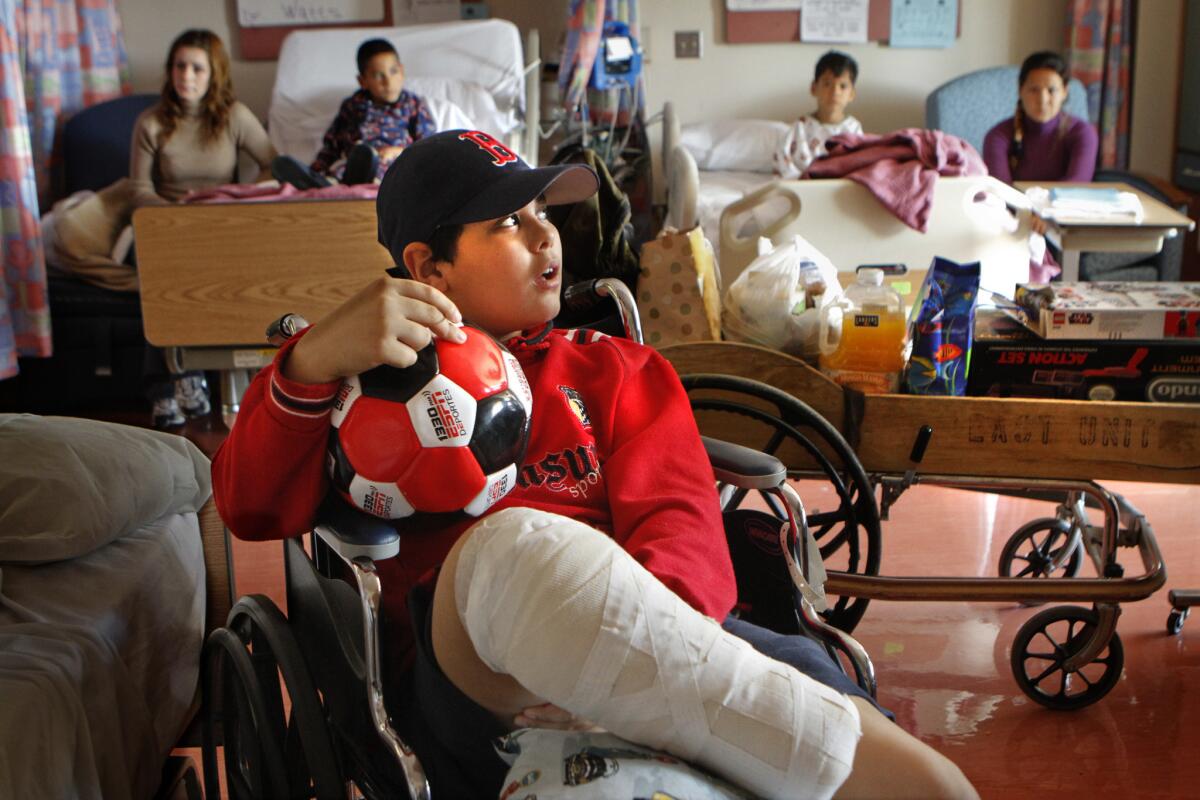Palestinian boy once treated in L.A. finds himself under fire again

Abdullah Alathamna was 7 years old the first time the Israeli military shelled his family’s home in the northern Gaza Strip in 2006. In a blink, he lost his mother, two sisters and his right foot.
The attack was a mistake, Israeli officials later said. Ehud Olmert, then Israel’s prime minister, apologized and said soldiers had misfired while targeting Hamas militants who had launched rockets into Israel.
In time, Abdullah’s father remarried, had more children and built a new home in the neighborhood of Beit Hanoun. Abdullah, who had undergone a botched surgery in Egypt immediately after the attack, spent much of the next several years getting the damage corrected. A nonprofit organization that provides medical treatment to injured Palestinian children paid for him to visit hospitals in the United States and Dubai.
In 2010, he spent two months in Los Angeles, where he was fitted with an artificial leg.
After that, he returned to Gaza. His limp was barely perceptible as he played with his young siblings. This year, he turned 15. He dreams of becoming a doctor.
On Friday night, with Gaza engulfed in another bloody confrontation between Israeli forces and Hamas, Abdullah’s home was once again struck by Israeli bombs. Shrapnel lodged in his back and in his left leg. It also damaged his prosthetic leg, making it unusable.
He and his family members, who were shaken and bloodied in the attack but who did not suffer life-threatening injuries, fled the home in their pajamas. Abdullah was unable to walk, so his father and grandfather took turns carrying him.
For the last several days the family has been living in their car outside a United Nations-run school in the refugee camp of Jabaliya.
In a phone interview, Abdullah said conditions at the school were extremely crowded, with the line for the bathroom stretching more than 200 people.
He said he dreads the evenings, when the bombing resumes. “It’s very scary,” he said.
Being at a U.N. facility is no guarantee of safety. On Thursday, a U.N. school in Beit Hanoun was shelled by the Israeli military, killing at least 15 people. Abdullah, who spent time at the Beit Hanoun school before moving to Jabaliya, said five members of his extended family were among the dead.
Israeli officials say they are doing all they can do avoid civilian casualties. They say they warned U.N. officials to evacuate the school, near which militants were believed to have been launching rockets.
The United Nations has estimated that as many as three-quarters of the more than 700 people killed in Gaza since the Israeli offensive began more than two weeks ago have been civilians.
Abdullah said he has been in touch with several people he met while receiving treatment abroad.
Rima Qaru, who works with the Palestine Children’s Relief Fund, the nonprofit group that arranged for Abdullah’s treatment, said the group is working to provide his family with diapers, clothing and other essentials they had to leave behind when they fled their home last week.
If a cease-fire is reached, the group will try to help Abdullah be fitted for a new prosthesis, she said.
A few days ago, Abdullah received a call from George Abuhamad, who hosted him in Yorba Linda while the boy was being fitted for his prosthetic leg. Abuhamad said he has been watching the news out of Gaza anxiously and felt helpless.
“I want to get him out of there,” Abuhamad said. “But I can’t.”
Twitter: @katelinthicum
More to Read
Start your day right
Sign up for Essential California for news, features and recommendations from the L.A. Times and beyond in your inbox six days a week.
You may occasionally receive promotional content from the Los Angeles Times.







